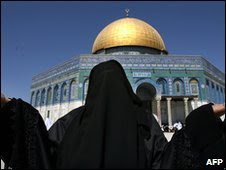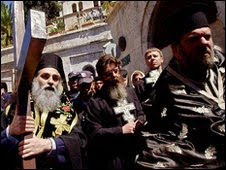 Jerusalem's Old City is sacred to Jews, Christians and Muslims
Jerusalem's Old City is sacred to Jews, Christians and Muslims
Our first night was a disaster.
We had finally got the keys to our new home. A wiry teenager had wheeled our bed on a handcart through the narrow, carless streets.
But as we turned out the light, Arabic pop music, cheers and whistles blasted in through the window of our new flat as neighbours celebrated a wedding.
And after just a few hours sleep we were jolted awake by the sound of a massive, room-shaking bang.
We eventually worked out that it was not the start of the third intifada, or Palestinian uprising. It was just a cannon fired to signal the start of the day's fast during the Muslim month of Ramadan.
Uneasy truce
Jerusalem is a divided city in a divided land. And at its heart, is the Old City, itself divided into Muslim, Christian, Jewish and Armenian quarters.
It is home to Judaism's holiest site, Islam's third holiest and the spot where many Christians believe Jesus was crucified.
Control of the area is one of the toughest issues facing anyone trying to make peace between Israel and the Palestinians.
But even so, an uneasy coexistence is lived out day-to-day, albeit under the watchful eyes of clusters of armed Israeli police.
 Jerusalem's Old City is part of a wider political struggle
Jerusalem's Old City is part of a wider political struggle
Orthodox Jews in black coats and fox fur hats pick their way through shouting Palestinian street hawkers, as they go to pray at the Western Wall.
There are single shops where tourists can pick up a Jewish menorah, an olive wood crucifix, or a plate depicting al-Aqsa mosque.
And I have watched two young men who run neighbouring coffee shops, one Muslim, one Jewish, tease and hug each other in an open display of friendship.
But relations are not often so cordial.
At politically volatile times, like Muslim Friday prayers during the Israeli operation in Gaza, the police presence multiplies dramatically, and tensions with it.
Pungent aromas
I once showed two Israeli guests the route to see my favourite rooftop view. "When do we get kidnapped?" they half-joked anxiously, as we walked through the Muslim quarter.
 Carts are often the only way of moving goods through the narrow streets
Carts are often the only way of moving goods through the narrow streets
*
We live in the Christian quarter, home to Palestinian and Israeli-Arab Christians.
Nearby is one solitary house displaying an Israeli flag. Skull-capped children play behind high fences, watched by security guards. It is part of the political struggle, house by house, for control of the old city.
And when the Jewish residents and the Palestinians who live next to them meet on the streets they pass in stony silence.
But while controversy is never far away, the sights and sounds of the Old City are often far more mundane.
There are cats everywhere. From mangy, yowling toms to adorable, defenceless kittens, they especially like to roam the meat market, with its bewildering array of animal innards.
And there are the smells, incense wafts from churches mixing with the aroma of roasting Arabic coffee, and the pungent reek of rotting vegetables.
Car-free streets
The only vehicles that can navigate the narrow streets are hand carts and small tractors, which groan their way up special concrete ramps on the stone steps.
When we recently moved to a larger flat, we hired one of these tractors, piled our possessions into its trailer and watched them lurch their way to our new home.
Without car access there is a lot of carrying to do. We decided to start a roof garden. The locals looked on in bemusement as we slogged past carrying armfuls of foliage and backpacks filled with sacks of compost.
And there was the time I found myself trying to lug an electric radiator through crowds of South Korean Christian pilgrims, as they were reflectively walking the route Jesus is said to have taken to his crucifixion.
An acquaintance recently rang up and heard clanging monastery bells in the background. "You live in the Old City? How do you stand all that religious noise?" he asked.
We hear the bells from the Holy Sepulchre church, the horn announcing the start of the Jewish Sabbath, and at dusk every night the Muslim call to prayer echoes over the forest of rooftop satellite dishes.
Most of the time it is part of the furniture in this unique place where the world's three major monotheisms meet.
But I have to admit, when Ramadan came round again, and the massive, unexpected boom of the cannon erupted, a few very unholy words passed my lips.
Source:

No comments:
Post a Comment